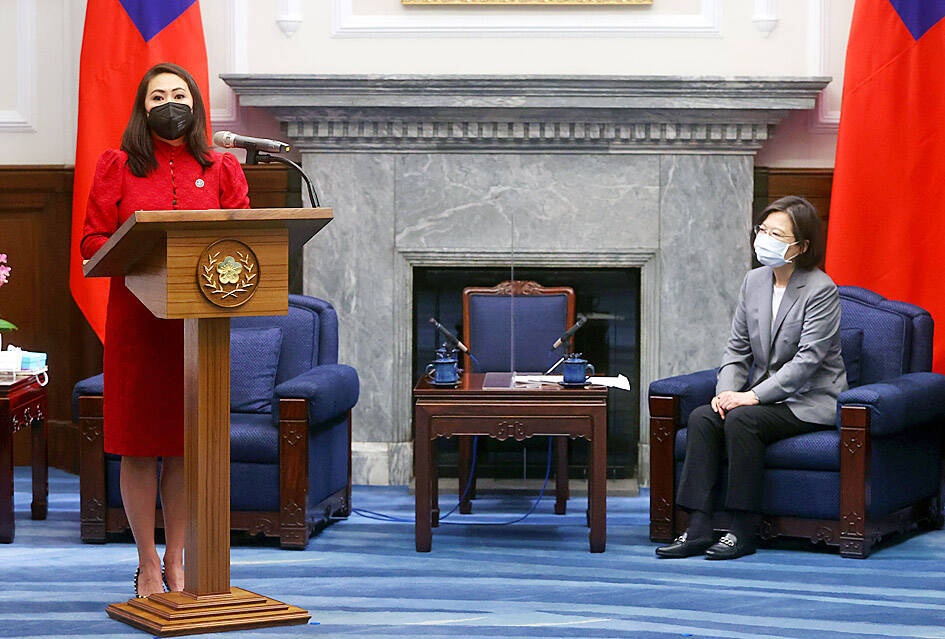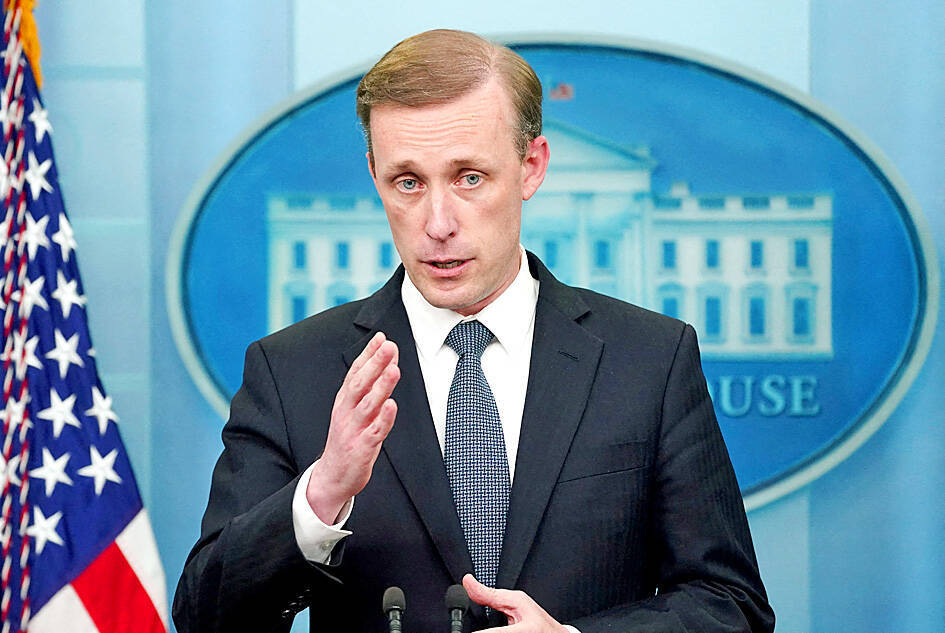A US congressional delegation led by US Representative Stephanie Murphy yesterday met with President Tsai Ing-wen (蔡英文) to express support for Taiwan amid escalating threats from China.
Murphy, who is the vice chair of the US House of Representatives Subcommittee on Intelligence and Special Operations, arrived in Taiwan on Wednesday night, along with seven other US representatives.
It is the second congressional delegation visiting the nation since a visit by US House Speaker Nancy Pelosi early last month.

Photo: CNA
Following China’s extensive military drills in the region over the past few weeks, the visit conveys the US Congress’ “rock solid” support for Taiwan, Tsai told the US delegation.
Tsai expressed hope that Taiwan and the US would sign a “high-standard economic trade agreement” through the US-Taiwan Initiative on 21st-Century Trade, as well as an agreement to avoid double taxation.
Murphy told Tsai that the US-Taiwan relationship still grows and flourishes more than 40 years after the US’ Taiwan Relations Act took effect in 1979, adding that opportunities for closer cooperation and coordination across trade, security and cultural exchanges have also grown.

Photo: REUTERS
The US Congress should advocate for greater Taiwanese participation in international organizations, Murphy said.
“Taiwan has shown itself to be a responsible member of the international community, especially in public health issues, and it deserves to participate in international fora when appropriate,” she said.
“One of the most important things that the US Congress can do right now is to deepen economic relationships with Taiwan by pushing for a high-quality free-trade agreement between the US and Taiwan,” she added.
Separately, US National Security Adviser Jake Sullivan said a Chinese invasion of Taiwan remains a “distinct threat,” while insisting that the administration of US President Joe Biden has not changed its position over the nation’s status, despite Chinese claims to the contrary.
“I think it remains a distinct threat that there could be a military contingency around Taiwan,” Sullivan said in an interview for The David Rubenstein Show: Peer-to-Peer Conversations on Bloomberg Television.
Although Sullivan offered no prediction of when such an attack might occur, he said: “The People’s Republic of China has actually stated as official policy that it is not taking the invasion of Taiwan off the table.”
As the Biden administration grapples with increased tension over Taiwan, Sullivan said he planned to meet congressional leaders later on Wednesday to discuss a bill that would alter US policy toward Taiwan, including designating it a major non-NATO ally.
The bill, sponsored by Democrats, has wide bipartisan support.
The legislation would also provide Taiwan with US$4.5 billion in security aid and support its participation in international organizations.
“There are elements of that legislation with respect to how we can strengthen our security assistance for Taiwan that are quite effective and robust that will improve Taiwan security,” Sullivan told Rubenstein. “There are other elements that give us some concern.”
“The American position has remained steadfast and consistent,” Sullivan said. “We continue to believe that and we will continue to push back against any effort to change the status quo by force.”
The Chinese embassy in Washington did not immediately respond to a request for comment about Sullivan’s remarks.
However, in a meeting with reporters last month, Chinese Ambassador to the US Qin Gang (秦剛) said the US has “done too much” and is going “too far” in the region.
He called on the US to avoid escalating the situation and said China would be forced to respond if it does.
Qin also downplayed the threat of an imminent Chinese attack on Taiwan, saying he was not aware of a specific timeline.
“People are over-nervous about it,” he said, adding that speculation that China had moved up the timeline for an invasion was “baseless.”
Additional reporting by Bloomberg

ROLLER-COASTER RIDE: More than five earthquakes ranging from magnitude 4.4 to 5.5 on the Richter scale shook eastern Taiwan in rapid succession yesterday afternoon Back-to-back weather fronts are forecast to hit Taiwan this week, resulting in rain across the nation in the coming days, the Central Weather Administration said yesterday, as it also warned residents in mountainous regions to be wary of landslides and rockfalls. As the first front approached, sporadic rainfall began in central and northern parts of Taiwan yesterday, the agency said, adding that rain is forecast to intensify in those regions today, while brief showers would also affect other parts of the nation. A second weather system is forecast to arrive on Thursday, bringing additional rain to the whole nation until Sunday, it

LANDSLIDES POSSIBLE: The agency advised the public to avoid visiting mountainous regions due to more expected aftershocks and rainfall from a series of weather fronts A series of earthquakes over the past few days were likely aftershocks of the April 3 earthquake in Hualien County, with further aftershocks to be expected for up to a year, the Central Weather Administration (CWA) said yesterday. Based on the nation’s experience after the quake on Sept. 21, 1999, more aftershocks are possible over the next six months to a year, the agency said. A total of 103 earthquakes of magnitude 4 on the local magnitude scale or higher hit Hualien County from 5:08pm on Monday to 10:27am yesterday, with 27 of them exceeding magnitude 5. They included two, of magnitude

CONDITIONAL: The PRC imposes secret requirements that the funding it provides cannot be spent in states with diplomatic relations with Taiwan, Emma Reilly said China has been bribing UN officials to obtain “special benefits” and to block funding from countries that have diplomatic ties with Taiwan, a former UN employee told the British House of Commons on Tuesday. At a House of Commons Foreign Affairs Committee hearing into “international relations within the multilateral system,” former Office of the UN High Commissioner for Human Rights (OHCHR) employee Emma Reilly said in a written statement that “Beijing paid bribes to the two successive Presidents of the [UN] General Assembly” during the two-year negotiation of the Sustainable Development Goals. Another way China exercises influence within the UN Secretariat is

Taiwan’s first drag queen to compete on the internationally acclaimed RuPaul’s Drag Race, Nymphia Wind (妮妃雅), was on Friday crowned the “Next Drag Superstar.” Dressed in a sparkling banana dress, Nymphia Wind swept onto the stage for the final, and stole the show. “Taiwan this is for you,” she said right after show host RuPaul announced her as the winner. “To those who feel like they don’t belong, just remember to live fearlessly and to live their truth,” she said on stage. One of the frontrunners for the past 15 episodes, the 28-year-old breezed through to the final after weeks of showcasing her unique